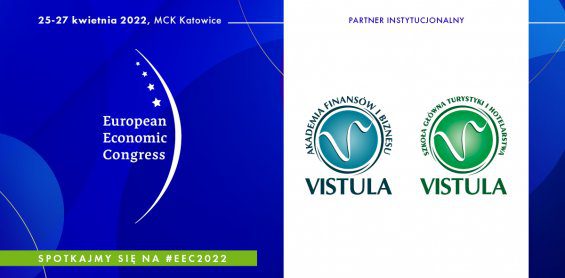14th European Economic Congress – important debates with the participation of experts from Vistula University

The 14th European Economic Congress was held in Katowice with the participation of experts from the Vistula Group of Universities. Our lecturers moderated or participated in important debates on disinformation, the future of Europe, green investments, Polish-German economic relations, women in business, and the meetings industry. Vistula was the institutional partner of what is the largest business event in Central and Eastern Europe.
The European Economic Congress (EEC) is an important part of the public debate about the Polish and European economies. Vistula’s Universities are involved in this initiative, because we focus on co-operation, and we share knowledge – this is our social responsibility. Also, this year, our experts were at the forefront of this event.
In the face of the war for Ukraine, an extremely important debate was the discussion about the future of a common Europe, with the participation of Valdis Dombrovskis, Executive Vice- President of the European Commission for the Economy, former Prime Minister, Prof. Jerzy Buzek, and Konrad Szymański, Minister for the European Union in the Chancellery of the Prime Minister. Vistula University was represented by Bartłomiej E. Nowak, PhD. The panel participants emphasised that the direct consequences of the war would be an economic slowdown, a new approach to energy policy, and a serious change in trade relations with Russia. However, it was pointed out that the European Union can emerge stronger from this situation. – In recent years, we have had a lot of crises, which were referred to as the so-called ‘existential’ – if we do not overcome them, the Union will cease to exist. Currently, the EU is in a historic moment of development, so we must act together as a Community, but it is also a challenge for national policies, Bartłomiej E. Nowak stressed.
In the context of Russian aggression against Ukraine, disinformation is becoming a growing problem. It is applied to Poland on a large scale, and cannot be underestimated. It is subtle, and adapted to Polish audiences, because a simple pro-Russian message in Poland would not have much impact. The debate on disinformation was led during the European Economic Congress by Agnieszka Legucka, PhD, a lecturer at Vistula University, and analyst at the Polish Institute of International Affairs. – The best way not to become misinformed is to keep a healthy distance. You have to take a deep breath and check what reaches us in reliable sources she emphasised. According to her, such reliable sources may very well be fact-checking portals that check information. Most Poles would like to subsidise them and recognise the need for their existence.
The Vistula School of Hospitality was represented during the congress by Pro-rector, Rafał Szmytke, and Piotr Tatara, Director of the Institute of Tourism, who participated in the panel on Tourism and Hospitality.
Krzysztof Celuch, PhD., the Rector’s Proxy for Co-operation with the Socio-Economic Environment, and Magdalena Kondas, President of the University’s Business Council, shared their knowledge during the debate on the meetings industry. Our experts have expressed their opinion that this sector is an important pillar of the economies in Poland, and in the world. – The meetings industry changes the world, generates business, and defines everything that happens around interactions between people asserted Krzysztof Celuch. This sector creates opportunities for building a completely new type of industry, with which, we can build the Polish economy of the future.
In every economy – Polish and global – women play an increasingly important role, although they still earn less, and men dominate in business. Organisational culture that supports diversity and inclusiveness, as well as the benefits of team diversity, have been at the centre of the debate on Women leaders declared Joanna Burnos, a lecturer at Vistula University, founder of the LEADERIS Institute, and a member of the Advisory Board of The Alliance Of Her in Brussels. – ‘The conversation with representatives of the world of business, industry, education, and NGOs became a source of inspiration and reflection on issues related to female leadership’, she summed up – the discussion. Such events make sense. They motivate and lead to real change.